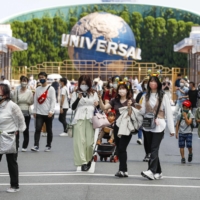As the restrictions on business operations were partially eased Tuesday under an extended state of emergency, department stores, large cinemas and amusement parks in Tokyo and Osaka Prefecture reopened after more than a month of closures.
Such businesses had complained of a severe impact after being requested to close partly or fully in late April when the current virus emergency was first introduced. The emergency declaration in Tokyo and nine other prefectures has been extended until June 20 after the government failed to lift it on Monday as scheduled earlier.
The government of Prime Minister Yoshihide Suga set new guidelines for businesses when it decided on the extension last week, aiming to strike a balance between curbing coronavirus infections and reviving the battered economy.
Under the guidelines, department stores are permitted to operate fully on weekdays with shortened business hours while continuing to be limited on weekends to opening food courts and sections selling daily necessities.
In Osaka and Tokyo, all department stores run by Isetan Mitsukoshi Holdings Ltd. and H2O Retailing Corp., the operator of the Hankyu and Hanshin department stores, fully resumed weekday operations Tuesday.
Universal Studios Japan in Osaka restarted business the same day for the first time since its closure on April 25 and people were waiting in line in front of its gates from two hours before opening.
The park will open only on weekdays and remain closed on weekends.
“I really want to enjoy USJ since it’s been a while. I also want to pay attention to avoiding an infection at the same time,” said a 30-year-old woman from Osaka who was visiting the park with a friend.
The operator has capped the number of visitors at 5,000 per day and installed acrylic partitions between guest tables at restaurants in the park.
It will also ask visitors to leave the park at separate times to avoid large groups of people.
At a cinema complex in Osaka, a 26-year-old man said he was “waiting and waiting for the reopening.”
A film company official said theaters can expect people to come after work if they run movies until 9 p.m.
The economic pain for restaurants and bars, however, is set to continue with restrictions such as a ban on serving alcohol and closing by 8 p.m. A cap on attendance at sports events and concerts will also remain.
Currently, a state of emergency is in force in 10 prefectures in total, with the measure extended in nine of them, including Tokyo and Osaka, from the previous end date on Monday.
Okinawa Prefecture was the latest to come under the measure on May 23 and it was already set to last until June 20.
The government has laid out four levels of concern under the pandemic, based on metrics including the pace of infections and the availability of hospital beds. With the seven-day moving average of new cases in the capital still over 500, the capital remains in the most serious category — Stage 4.
Despite the worry over the numbers, Japan still has the lowest overall infection numbers among Group of Seven countries. It posted a daily average of 3,634 new cases over the seven days to Sunday, compared to a figure of 20,055 in the U.S. in the same period.
In a time of both misinformation and too much information, quality journalism is more crucial than ever.
By subscribing, you can help us get the story right.
SUBSCRIBE NOW




